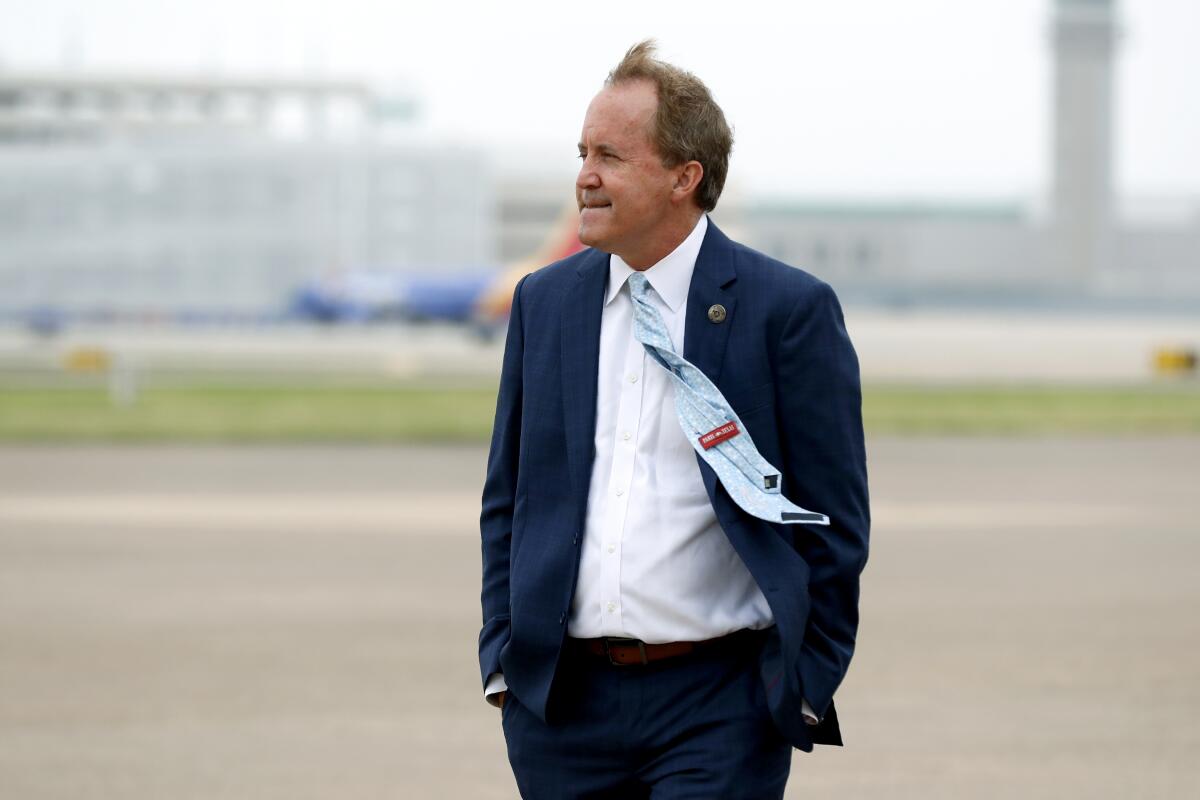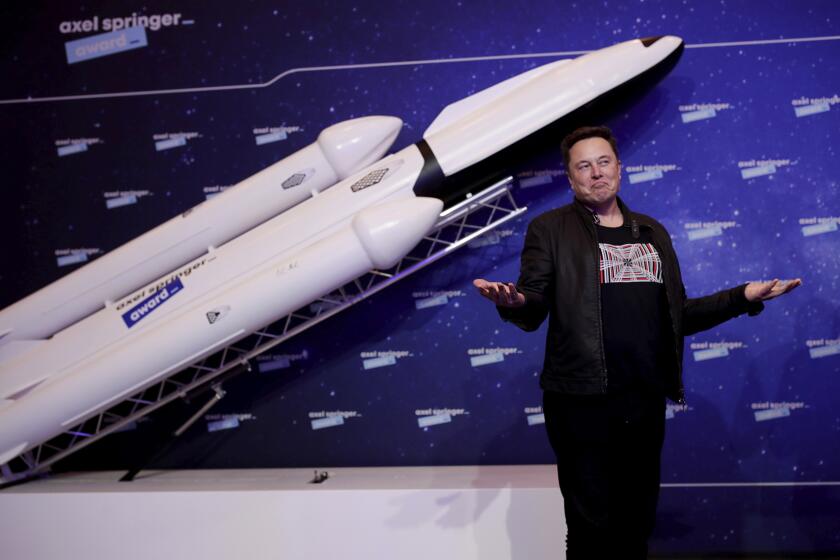GOP politicians are helping Musk turn his Twitter deal into even more of a circus

- Share via
If one chooses to tip one’s hat to Republican leaders in the state of Texas, it’s to acknowledge their determination to distract their voters from the most urgent matters at hand.
Exhibit A: Atty. Gen. Ken Paxton. With funerals for the 19 children and two adults slaughtered by a gunman in Uvalde, Texas, still taking place and scheduled to continue at least into next week, Paxton has taken a strong stand — about Twitter.
On Monday, Paxton announced that he has launched an investigation into whether Twitter has lied about the percentage of fake accounts, or “bots,” on its platform.
If Twitter is misrepresenting how many accounts are fake to drive up their revenue, I have a duty to protect Texans.
— Texas Atty. Gen. Ken Paxton
If you think this is an odd thing for Paxton to stick his nose into, you’re not paying attention to the context, which is that the percentage of bots on Twitter has become a big issue for Elon Musk in his quest to wriggle out of the terms of his $44-billion deal to acquire Twitter.
Musk has made a big point of moving the headquarters of Tesla, his electric-car company, to Texas from California, garnering gratitude from Texas Gov. Greg Abbott.
Get the latest from Michael Hiltzik
Commentary on economics and more from a Pulitzer Prize winner.
You may occasionally receive promotional content from the Los Angeles Times.
Abbott has said that Musk told him he “had to get out of California because, in part, of the social policies” in California and that Musk “consistently tells me that he likes the social policies in the state of Texas.” Those policies include one of the most draconian antiabortion laws and some of the loosest gun laws in the nation.
Back in May, Musk also said that he would be voting Republican in the upcoming elections, after having voted for Democrats before. Abbott and Paxton are both Republicans.
Paxton is not the only Republican to take an attitude over Twitter. The GOP has long groused that the platform has disadvantaged conservatives in its account-blocking practices; in April, a group of 18 House Republicans hinted that they would investigate the company’s deal-making with Musk if they gain the majority.
Paxton rationalized his grandstanding on Musk’s behalf by asserting that Twitter’s “potentially false reporting” of fake accounts could violate the Texas Deceptive Trade Practices Act. “If Twitter is misrepresenting how many accounts are fake to drive up their revenue, I have a duty to protect Texans,” he said.
How does Elon Musk get away with his shenanigans? Because regulators are intimidated.
“Twitter has received intense scrutiny in recent weeks” for its claim that “fewer than 5% of all users are bots,” Paxton said.
Some points about that: First, the “intense scrutiny” has come from exactly one person, Elon Musk, who as we’ll explain may have an ulterior motive for raising the issue; neither Musk nor anyone else has presented a speck of evidence that Twitter has been misleading about fake accounts.
Second, Paxton is wrong to say Twitter has claimed that fewer than 5% of all its users are bots; Twitter has said fewer than 5% of all its “monetizable” users are bots, a category that already excludes bots that it has identified and taken steps to throw off the platform.
Third, Paxton has some nerve making an accusation of fraud against anyone. That’s because he himself is under indictment for alleged fraud, in a case that has been sitting around unresolved in the Texas court system for seven years without trial. He also is reportedly under criminal investigation by the FBI in a separate matter. He has pleaded not guilty in the state case and says there’s nothing to the FBI’s investigation.
There’s no escaping the fact that Paxton’s foray into the Twitter case has made Musk’s takeover bid even more of a circus than it was before. Let’s review the chronology.
The adventure started April 4, when Musk disclosed in a filing with the Securities and Exchange Commission that he had acquired a 9.2% stake in Twitter worth about $3 billion. He asserted in the filing that the purchases were designed as a passive investment and that he had no intention or desire to influence Twitter.
The SEC is investigating whether Musk misled investors with that filing, and why Musk violated its regulations by delaying a formal disclosure of his Twitter stock purchases by more than a week after he should have reported them.
The day after Musk disclosed his holding, Twitter said he had agreed to join its board and limit his future stock purchases. Musk subsequently reversed himself, rejected the overture, and on April 13 announced an offer to acquire all of Twitter’s outstanding shares at $54.20 each, well above their trading price, or about $44 billion, and would subsequently take Twitter private. The Twitter board accepted the deal on April 25.
Elon Musk has appeared to waste no time before violating his merger agreement with Twitter.
The deal was binding except under very limited circumstances; Musk said he would perform no due diligence on the company — the examination of a target’s books and records to ensure that there are no hidden pitfalls or conditions that could interfere with a successful takeover.
Since then, however, Musk has given multiple signals that he is experiencing buyer’s remorse. He appears to be searching for a pretext to justify his negotiation for a lower price or to abandon the deal entirely.
One reason may be that the Twitter bid has contributed to a slide in Tesla shares, at least partially because Musk has planned to borrow against his holdings to finance the bid, posing the chance that he might have to sell shares to make his nut.
Tesla shares have fallen by more than 36% since he announced his Twitter acquisitions on April 4 and about 27% since the takeover deal was announced on April 25. At their current price of about $730, they’ve lost more than 40% from their peak of about $1,230 last Nov. 4.
Musk has been tweeting attacks on Twitter’s executives and company policies; that’s a potential breach of a deal provision aimed at forbidding him from disparaging the company while the takeover formalities are being worked out.
More recently, he questioned Twitter’s estimate that fewer than 5% of its “monetizable daily active users” were false or spam accounts — a figure that Twitter has been disclosing for years.
Musk has demanded the opportunity to perform his own analysis based on data he has requested from the company, which the company has refused. Musk said at first that his doubts about the statistic had put the deal “on hold,” even though that’s a meaningless assertion under the deal terms.
Elon Musk has used Twitter to violate securities law and smear his critics. Placing him on the Twitter board is a terrible idea.
On Monday, however, Musk really lowered the boom on Twitter. In another SEC filing, he asserted that the company’s refusal to turn over the data he requested was “a clear material breach” of the takeover deal and might prompt him to “terminate the merger agreement.”
Twitter on Wednesday appeared to call Musk’s bluff by offering him access to data from the 500 million tweets a day posted on the platform, according to the Washington Post.
All this byplay has predictably undermined confidence that the deal will ever happen. That’s especially true among the bankers lined up to provide financing for the takeover, who have been indicating some difficulty at finding investors for the loans they have offered Musk.
That in turn may point to Musk’s true intentions, because one of the conditions that allows him to walk away is the failure to obtain financing. If he abandons the bid without good reason, he could be on the hook for a $1-billion penalty, or even for a court order that he complete the deal at the agreed-on price.
Wall Street investors have been voting with their feet on Musk’s Twitter deal. The price of Twitter stock, which should be converging with the $54.20 of Musk’s bid, has never closed higher than $51.70, which it reached the day the deal was announced. Since then, it has traded as low as $35.40, which is 34.6% below the offer price, an amazing spread for a deal that faces no known regulatory obstacles. On Thursday, Twitter closed at $39.53.
Musk’s plan to take over Twitter has become reduced to a sideshow act, with speculation focused not on when he will close the acquisition, but whether he ever will, and how and at what cost he will wriggle away.
The whole affair has turned into a lesson in how to undermine the principles of financial deal-making that have lubricated commerce for decades. Sadly, it’s not surprising that Elon Musk would stretch the limits of good faith this way. Nor, even more sadly, is it disturbing that Texas’ top legal official, laboring as he is under the cloud of criminal charges, would prioritize Musk’s whims ahead of the real crises in the state.
More to Read
Get the latest from Michael Hiltzik
Commentary on economics and more from a Pulitzer Prize winner.
You may occasionally receive promotional content from the Los Angeles Times.













